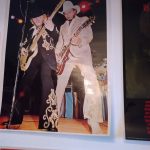ZZ Top bassist and supporting/co-vocalist Dusty Hill passed away last Wednesday. While he lived a good, full and productive musical life (and I would expect in general), it still hurts to know he isn’t around anymore. The three men from the world’s most seasoned power trio had been together for more than fifty years. And though it seemed like it could never happen, now the legendary Little Ol’ Band from Tejas is down to two of its three original members.
-

-

I took a History of Jazz & Rock class back in my first year of college (and last year of high school). One day, early on in the semester, our professor asked everyone which band, act, or group had been together the longest without having lost, fired and/or replaced a member(s). Was there any band that had lasted more than 20 years, 25 years, 30 years..? I don’t remember exactly how it all went down, but either he gave an answer of his own or he presented the question to all of us; regardless, the correct answer was never given. I recall leaving class that day feeling that something huge was just missed by everyone, and possibly by our music teacher too, and it’s something that stuck with me for quite some time. Eventually I was able to piece it all together and realize it was because the name ZZ Top—at this time well short of its eventual 51 year run which ended with Dusty passing—was actually the right answer. No other band came anywhere close, then or now.
In fact, not only did the band’s name never come up that entire class period, I don’t think it came up once the entire semester. This is probably not surprising though: ZZ Top is one of those bands that pretty much everybody likes, but most have no concept of how much depth actually exists to the band, its members, and their sound. Usually they’re regarded a goofy blues-rock band that wrote the mega-hits La Grange and Sharp Dressed Man, released the 10-million-plus-selling blockbuster Eliminator in the early 1980s, and somehow were always on the road touring with a distinctly fun-loving stage presence. Yet for a small percentage of the band’s listeners, we go absolutely ga-ga for ZZ Top and are laser-focused on the unassumed complexity that exists. Even a smaller chunk of these people understand that ZZ Top was an established supergroup the instant they also became a regular group. Billy Gibbons is a fantastic frontman and wonderfully talented musician, but don’t doubt that both Dusty and Frank are musically loaded for bear.
In particular, it’s easy to argue that Dusty had the best set of pipes in the band. Listen to him belt out his lines in the song Ten Dollar Man off 1976’s Tejas, or the call-and-response with Billy on Beer Drinkers & Hell Raisers from 1973’s Tres Hombres. While he always provided backup vocals and harmonies, Dusty’s vocal prowess was featured less in the 1980s and beyond, but he still could sing like few rock musicians can. The most immediate analogue of to Billy and Dusty I can think of is the supergroup Band of Gyspys with Buddy Miles’ vocals taking a backseat to Jimi’s: Jimi was typically up front singing, but Buddy would still let it rip or take on full duties for a song.
I guess the point is that having Dusty Hill as your backup singer is like having a flamethrower as a secondary weapon to complement a sawed-off shotgun. Plus he was one-half of the rhythm section in a widely accomplished and celebrated blues-rock band that somehow held things together for more than half a century. It’s impossible to describe how meaningful that is….
The pictures above are of an original 70s-era ZZ Top poster hanging in my music room with Dusty and Billy making it happen. Maybe it’s odd to see the guitar duo surrounded by heavy metal bands, but it shouldn’t be—you better believe that ZZ Top is as heavy as it gets.
Beer Drinkers & Hell Raisers 
 (track 03 from the Tres Hombres LP by ZZ Top
(track 03 from the Tres Hombres LP by ZZ Top 
 )
)
→ “Beer Drinkers & Hell Raisers” Song Lyrics 

Heard It on the X 
 (track 07 from the Fandango! LP)
(track 07 from the Fandango! LP)
→ “Heard It on the X” Song Lyrics 

Tush 
 (track 08 from the Fandango! LP)
(track 08 from the Fandango! LP)
→ “Tush” Song Lyrics 

Ten Dollar Man 
 (track 06 from the Tejas LP)
(track 06 from the Tejas LP)
→ “Ten Dollar Man” Song Lyrics 

Like this:
Like Loading...
![]()
![]() (track 02 from the Raoul and the Kings of Spain LP by Tears for Fears
(track 02 from the Raoul and the Kings of Spain LP by Tears for Fears ![]()
![]() )
)

![Tears for Fears' "Raoul and the Kings of Spain" album cover. [Formatted]](http://unwisdom.org/chadspace/wp-content/uploads/tears-for-fears-000003-500x500-1.jpg)


![John Fogerty's "The Blue Ridge Rangers Rides Again" album cover. [Formatted]](http://unwisdom.org/chadspace/wp-content/uploads/john-fogerty-000001-f500.jpg)
![The Cars' "Heartbeat City" album cover. [Formatted]](http://unwisdom.org/chadspace/wp-content/uploads/the-cars-000004-f500.jpg)